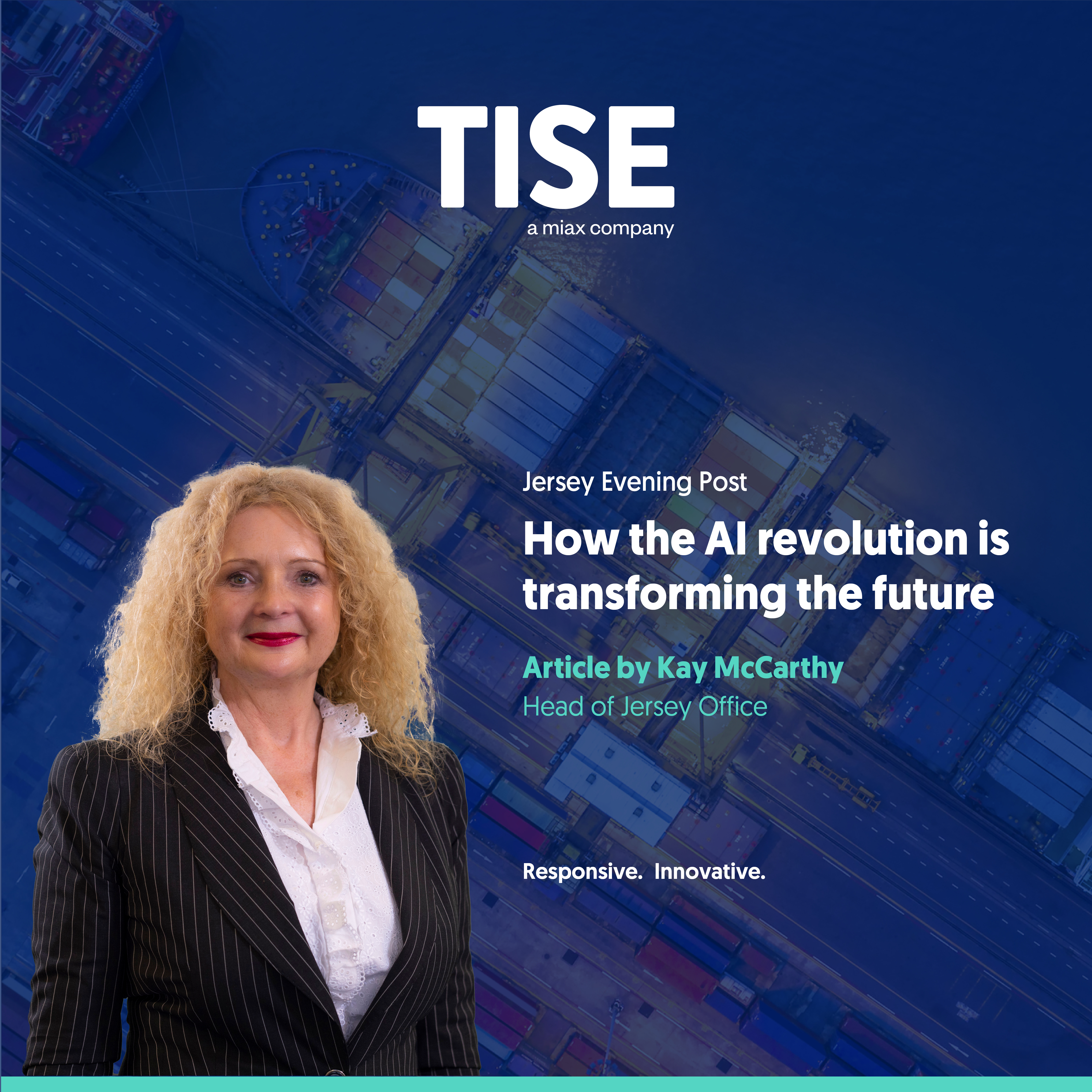Kay McCarthy, Head of Jersey Office at The International Stock Exchange (TISE), explains how AI is having a major impact across markets.
Artificial Intelligence (AI) is no longer a futuristic concept but a powerful force that is changing industries, economies and our daily lives. The AI revolution is predicted to be one of the most profound and transformative technological shifts in human history.
Many of us interact with AI daily. We use digital assistants, online shopping engines and smart home devices. We use Netflix to suggest entertainment, Siri to answer questions, Google Assistant to find information or Booking.com to plan our next trip. All these systems use machine learning algorithms to analyse patterns and then predict preferences to deliver personalised experiences.
Transforming industries
AI is having a significant impact across sectors and is transforming industries.
In healthcare, generative AI is speeding up the discovery of new medicines. Algorithms are analysing medical images from MRI scans with extraordinary accuracy, making diagnoses and predicting how diseases might develop. In the future, AI will enable personalised medicine and tailored treatment plans.
Applications are using AI in transportation to find the fastest routes and manage traffic flows. In August, Boeing’s subsidiary, Tapestry Solutions, announced it is introducing artificial intelligence and machine learning tools to accelerate US military transportation planning, aiding military transportation with AI.
"AI is having a significant impact across sectors and is transforming industries."
AI powered tools are being used in finance, checking for risk and detecting fraud. AI is revolutionising credit scoring by approving loans quicker and there are applications that can show people how to make the most of their savings.
In online shopping, AI personalises what we see, makes processes faster and adjusts prices. It helps companies understand what customers like by looking at their behaviour and it improves how goods are stored and shipped.
AI is being used extensively in security and law enforcement with the use of facial recognition technologies, fingerprint checks and drone monitoring. Whilst these tools help protect people and environments, they also give rise to concerns about privacy and how much we are being watched.
Transforming markets
With the help of AI, the global capital markets financial ecosystem is evolving rapidly.
Companies are embracing and integrating AI technologies to analyse complex datasets, stimulate market scenarios and execute tasks.
"With the help of AI, the global capital markets financial ecosystem is evolving rapidly."
In private equity, the impact of AI could be transformative. In the deal process, generative AI can significantly enhance the ability to source, evaluate and execute deals with greater precision and speed.
For stock market trading, AI technologies are being used to analyse past data, predict future trends and automate decision-making, allowing market traders to optimise their strategies and gain an edge in the market.
The backbone of AI: Data
Data has been described as the fuel of AI, as it is used to train and validate AI models. Back in 2006, British mathematician Clive Humby said that “data is the new oil”. Like oil, data is not useful in its raw state, it needs to be refined and processed to create a valuable entity. AI systems need good quality data to learn and make responsible decisions. Bias or poor-quality data can lead to negative outcomes.
Data is collected from a variety of sources, cleaned and used to train AI models. It can grow more valuable the more it is used. However, this also generates debate about privacy and how data is collected and used. There are laws in place like the General Data Protection Regulation (GDPR) which aim to protect individuals’ information but finding the right balance between using data and maintaining privacy is difficult.
The future of AI
In the future, companies will use AI to make decisions faster, offer personalised services and run their operations more smoothly. As AI gets smarter and more focused, it will be able to manage tasks on its own and provide insights at a speed not seen before. AI is pushing companies to invest in large technology projects.
"In the future, companies will use AI to make decisions faster, offer personalised services and run their operations more smoothly."
Big tech companies like Microsoft, Google and Amazon are spending billions on data centres to support training. These investments show how important AI is for future innovation and economic growth.
Challenges and ethical considerations
Even though AI has many benefits and its potential is immense, it also brings challenges.
Concerns include data privacy, unfairness in AI decisions and the impact on jobs. The possibility of creating Artificial General Intelligence - AI that outsmarts humans, is raising big questions about control and safety. The ‘godfather of AI’ Dr Geoffrey Hinton, who helped create artificial neural networks, in an interview with the BBC in May this year, warned about how quickly AI is developing.
Embracing AI
AI is not just a trend - it is a key part of the future. It is becoming more common in our everyday lives and across industries, offering new possibilities for growth, better efficiency and more innovation. As it matures it will unlock new possibilities across sectors and markets, whether it is optimising supply chains or diagnosing diseases, AI is transforming the future.
This article was originally published in the Jersey Evening Post, September 2025.

Kay McCarthy
Head of Jersey Office

